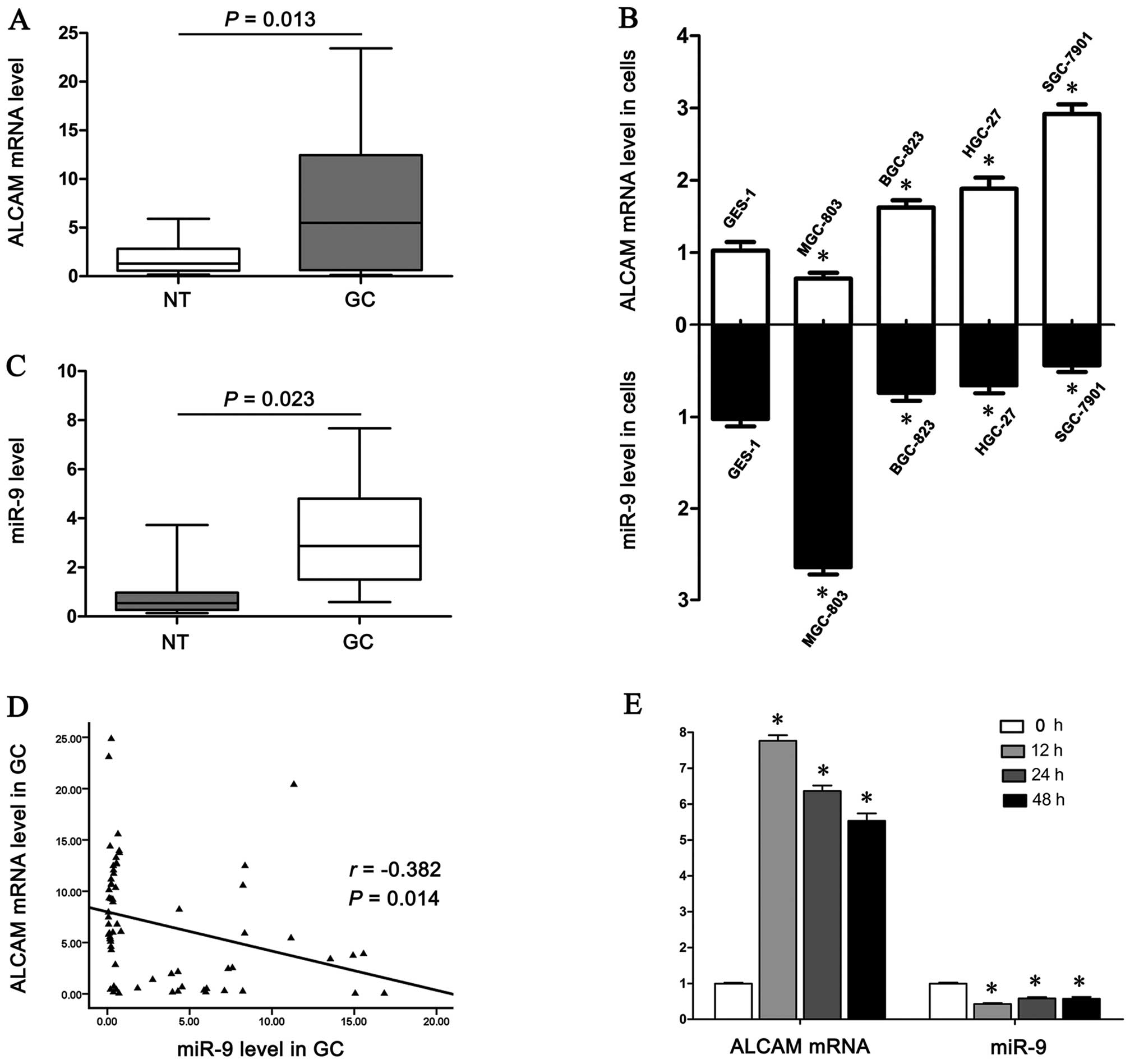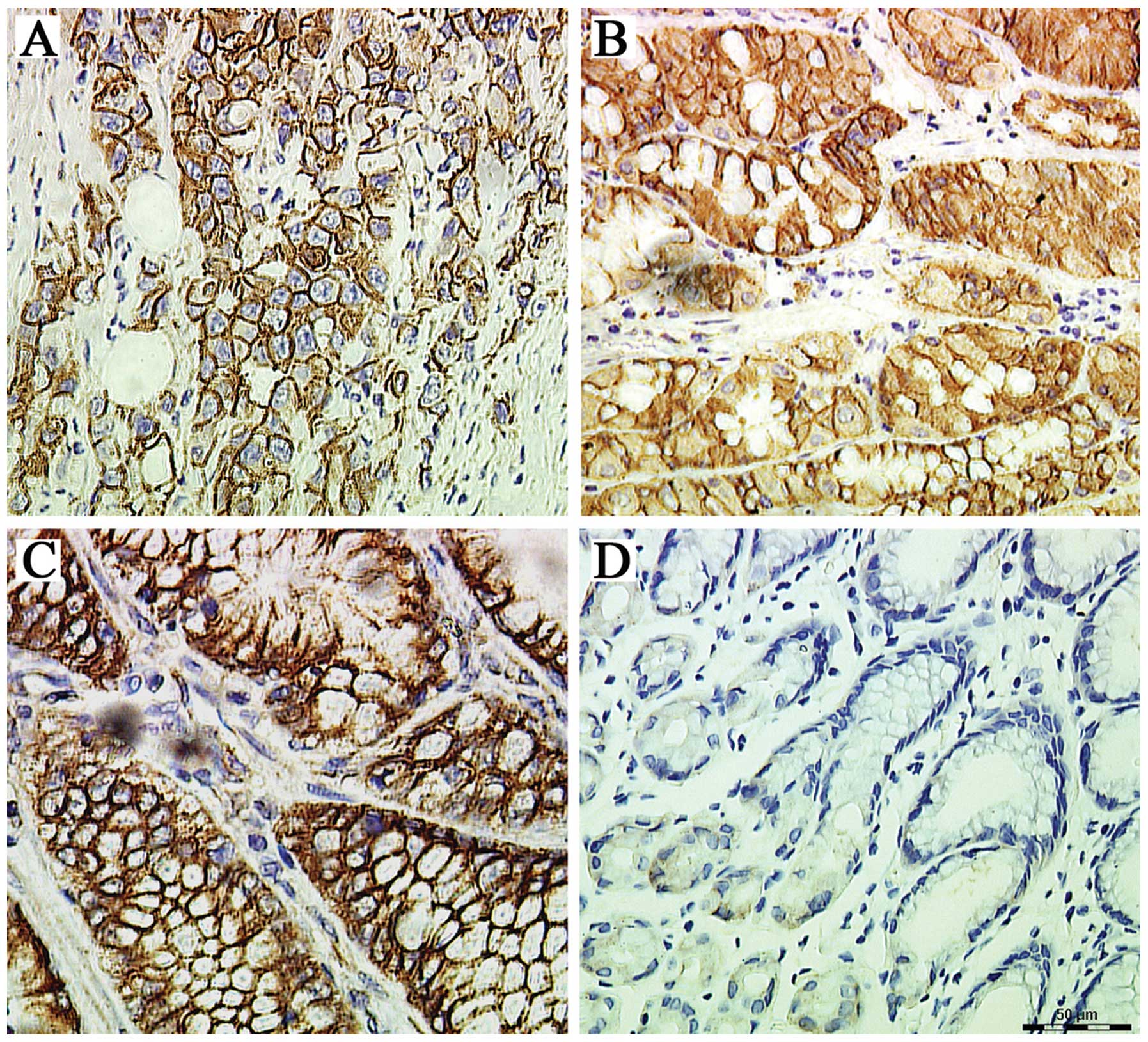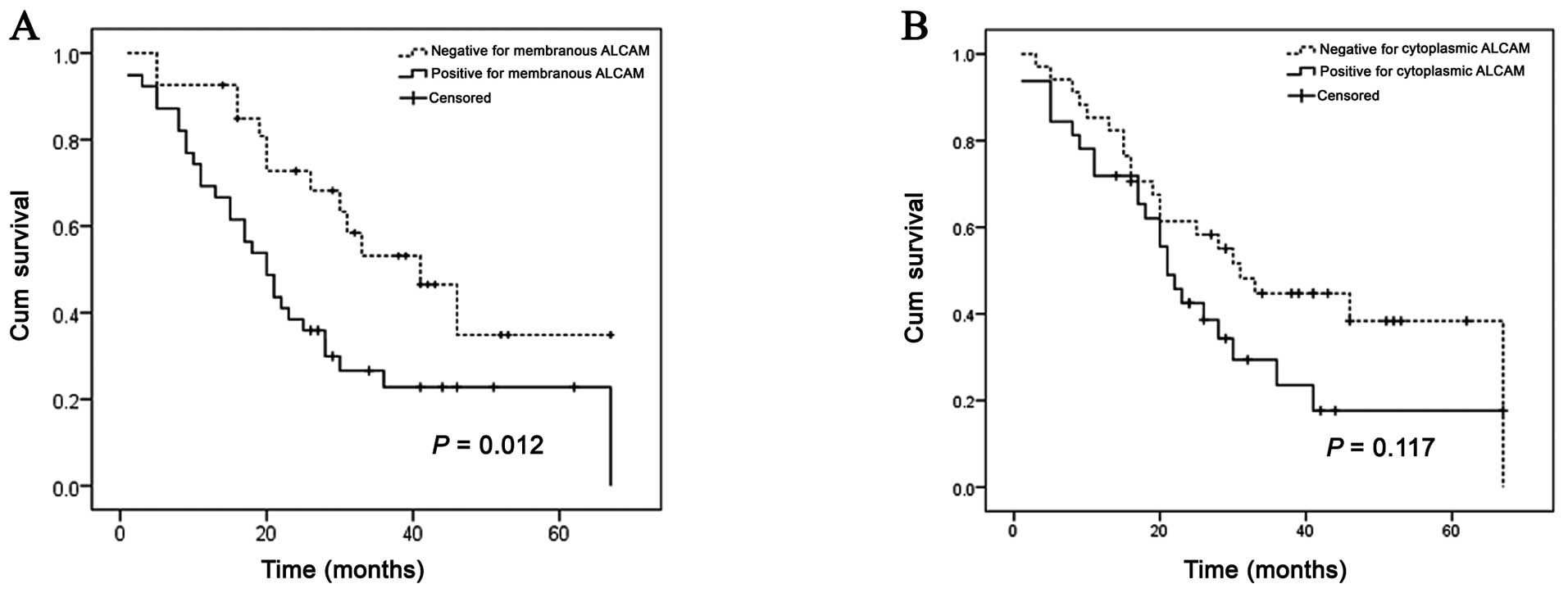|
1
|
Ofori-Acquah SF and King JA: Activated
leukocyte cell adhesion molecule: a new paradox in cancer. Transl
Res. 151:122–128. 2008. View Article : Google Scholar : PubMed/NCBI
|
|
2
|
Bowen MA, Patel DD, Li X, et al: Cloning,
mapping, and characterization of activated leukocyte-cell adhesion
molecule (ALCAM), a CD6 ligand. J Exp Med. 181:2213–2220. 1995.
View Article : Google Scholar : PubMed/NCBI
|
|
3
|
Patel DD, Wee SF, Whichard LP, et al:
Identification and characterization of a 100-kD ligand for CD6 on
human thymic epithelial cells. J Exp Med. 181:1563–1568. 1995.
View Article : Google Scholar : PubMed/NCBI
|
|
4
|
Bruder SP, Ricalton NS, Boynton RE, et al:
Mesenchymal stem cell surface antigen SB-10 corresponds to
activated leukocyte cell adhesion molecule and is involved in
osteogenic differentiation. J Bone Miner Res. 13:655–663. 1998.
View Article : Google Scholar : PubMed/NCBI
|
|
5
|
Sekine-Aizawa Y, Omori A and Fujita SC:
MuSC, a novel member of the immunoglobulin superfamily, is
expressed in neurons of a subset of cranial sensory ganglia in the
mouse embryo. Eur J Neurosci. 10:2810–2824. 1998. View Article : Google Scholar : PubMed/NCBI
|
|
6
|
Cortés F, Deschaseaux F, Uchida N, et al:
HCA, an immunoglobulin-like adhesion molecule present on the
earliest human hematopoietic precursor cells, is also expressed by
stromal cells in blood-forming tissues. Blood. 93:826–837.
1999.PubMed/NCBI
|
|
7
|
Fujiwara H, Tatsumi K, Kosaka K, et al:
Human blastocysts and endometrial epithelial cells express
activated leukocyte cell adhesion molecule (ALCAM/CD166). J Clin
Endocrinol Metab. 88:3437–3443. 2003. View Article : Google Scholar : PubMed/NCBI
|
|
8
|
Weidle UH, Eggle D, Klostermann S and
Swart GW: ALCAM/CD166: cancer-related issues. Cancer Genomics
Proteomics. 7:231–243. 2010.PubMed/NCBI
|
|
9
|
Kristiansen G, Pilarsky C, Wissmann C, et
al: ALCAM/CD166 is up-regulated in low-grade prostate cancer and
progressively lost in high-grade lesions. Prostate. 54:34–43. 2003.
View Article : Google Scholar
|
|
10
|
Weichert W, Knösel T, Bellach J, Dietel M
and Kristiansen G: ALCAM/CD166 is overexpressed in colorectal
carcinoma and correlates with shortened patient survival. J Clin
Pathol. 57:1160–1164. 2004. View Article : Google Scholar : PubMed/NCBI
|
|
11
|
Hein S, Müller V, Köhler N, et al:
Biologic role of activated leukocyte cell adhesion molecule
overexpression in breast cancer cell lines and clinical tumor
tissue. Breast Cancer Res Treat. 129:347–360. 2011. View Article : Google Scholar
|
|
12
|
Kijima N, Hosen N, Kagawa N, et al:
CD166/activated leukocyte cell adhesion molecule is expressed on
glioblastoma progenitor cells and involved in the regulation of
tumor cell invasion. Neuro Oncol. 14:1254–1264. 2012. View Article : Google Scholar :
|
|
13
|
Ishiguro F, Murakami H, Mizuno T, et al:
Membranous expression of activated leukocyte cell adhesion molecule
contributes to poor prognosis and malignant phenotypes of
non-small-cell lung cancer. J Surg Res. 179:24–32. 2013. View Article : Google Scholar
|
|
14
|
Lunter PC, van Kilsdonk JW, van Beek H, et
al: Activated leukocyte cell adhesion molecule (ALCAM/CD166/MEMD),
a novel actor in invasive growth, controls matrix metalloproteinase
activity. Cancer Res. 65:8801–8808. 2005. View Article : Google Scholar : PubMed/NCBI
|
|
15
|
Ikeda K and Quertermous T: Molecular
isolation and characterization of a soluble isoform of activated
leukocyte cell adhesion molecule that modulates endothelial cell
function. J Biol Chem. 279:55315–55323. 2004. View Article : Google Scholar : PubMed/NCBI
|
|
16
|
Tachezy M, Zander H, Marx AH, et al: ALCAM
(CD166) expression and serum levels in pancreatic cancer. PLoS One.
7:e390182012. View Article : Google Scholar : PubMed/NCBI
|
|
17
|
Tachezy M, Effenberger K, Zander H, et al:
ALCAM (CD166) expression and serum levels are markers for poor
survival of esophageal cancer patients. Int J Cancer. 131:396–405.
2012. View Article : Google Scholar
|
|
18
|
Ambros V: The functions of animal
microRNAs. Nature. 431:350–355. 2004. View Article : Google Scholar : PubMed/NCBI
|
|
19
|
Sethupathy P, Megraw M and Hatzigeorgiou
AG: A guide through present computational approaches for the
identification of mammalian microRNA targets. Nat Methods.
3:881–886. 2006. View
Article : Google Scholar : PubMed/NCBI
|
|
20
|
Mendes ND, Freitas AT and Sagot MF:
Current tools for the identification of miRNA genes and their
targets. Nucleic Acids Res. 37:2419–2433. 2009. View Article : Google Scholar : PubMed/NCBI
|
|
21
|
Wang J, Gu Z, Ni P, et al: NF-kappaB
P50/P65 hetero-dimer mediates differential regulation of
CD166/ALCAM expression via interaction with micoRNA-9 after serum
deprivation, providing evidence for a novel negative
auto-regulatory loop. Nucleic Acids Res. 39:6440–6455. 2011.
View Article : Google Scholar : PubMed/NCBI
|
|
22
|
Liu N, Sun Q, Chen J, et al: MicroRNA-9
suppresses uveal melanoma cell migration and invasion through the
NF-κB1 pathway. Oncol Rep. 28:961–968. 2012.PubMed/NCBI
|
|
23
|
Selcuklu SD, Donoghue MT, Rehmet K, et al:
MicroRNA-9 inhibition of cell proliferation and identification of
novel miR-9 targets by transcriptome profiling in breast cancer
cells. J Biol Chem. 287:29516–29528. 2012. View Article : Google Scholar : PubMed/NCBI
|
|
24
|
de Martel C, Forman D and Plummer M:
Gastric cancer: epidemiology and risk factors. Gastroenterol Clin
North Am. 42:219–240. 2013. View Article : Google Scholar : PubMed/NCBI
|
|
25
|
Ishigami S, Ueno S, Arigami T, et al:
Clinical implication of CD166 expression in gastric cancer. J Surg
Oncol. 103:57–61. 2011. View Article : Google Scholar
|
|
26
|
Lauren P: The two histological main types
of gastric carcinoma: Diffuse and so-called intestinal-type
carcinoma. An attempt at a histo-clinical classification. Acta
Pathol Microbiol Scand. 64:31–49. 1965.PubMed/NCBI
|
|
27
|
Lauwers GY, Carneiro F and Graham DY:
Gastric carcinoma. WHO Classification of tumors of the digestive
system. Bosman FT, Carneiro F and Hruban RH: IARC Press; Lyon: pp.
48–58. 2010
|
|
28
|
van den Oord CJJ, van Muijen GN, Weidle
UH, Bloemers HP and Swart GW: Activated leukocyte cell adhesion
molecule/CD166, a marker of tumor progression in primary malignant
melanoma of the skin. Am J Pathol. 156:769–774. 2000. View Article : Google Scholar : PubMed/NCBI
|
|
29
|
Ishiguro F, Murakami H, Mizuno T, et al:
Activated leukocyte cell-adhesion molecule (ALCAM) promotes
malignant phenotypes of malignant mesothelioma. J Thorac Oncol.
7:890–899. 2012. View Article : Google Scholar : PubMed/NCBI
|
|
30
|
van Kempen LC, Nelissen JM, Degen WG, et
al: Molecular basis for the homophilic activated leukocyte cell
adhesion molecule (ALCAM)-ALCAM interaction. J Biol Chem.
276:25783–25790. 2001. View Article : Google Scholar : PubMed/NCBI
|
|
31
|
Nelissen JM, Peters IM, de Grooth BG, van
Kooyk Y and Figdor CG: Dynamic regulation of activated leukocyte
cell adhesion molecule-mediated homotypic cell adhesion through the
actin cytoskeleton. Mol Biol Cell. 11:2057–2068. 2000. View Article : Google Scholar : PubMed/NCBI
|
|
32
|
Jannie KM, Stipp CS and Weiner JA: ALCAM
regulates motility, invasiveness, and adherens junction formation
in uveal melanoma cells. PLoS One. 7:e393302012. View Article : Google Scholar : PubMed/NCBI
|
|
33
|
Tomita K, van Bokhoven A, Jansen CF,
Bussemakers MJ and Schalken JA: Coordinate recruitment of
E-cadherin and ALCAM to cell-cell contacts by alpha-catenin.
Biochem Biophys Res Commun. 267:870–874. 2000. View Article : Google Scholar : PubMed/NCBI
|
|
34
|
Mezzanzanica D, Fabbi M, Bagnoli M, et al:
Subcellular localization of activated leukocyte cell adhesion
molecule is a molecular predictor of survival in ovarian carcinoma
patients. Clin Cancer Res. 14:1726–1733. 2008. View Article : Google Scholar : PubMed/NCBI
|
|
35
|
Rosso O, Piazza T, Bongarzone I, et al:
The ALCAM shedding by the metalloprotease ADAM17/TACE is involved
in motility of ovarian carcinoma cells. Mol Cancer Res.
5:1246–1253. 2007. View Article : Google Scholar
|
|
36
|
Weidle UH, Eggle D and Klostermann S:
L1-CAM as a target for treatment of cancer with monoclonal
antibodies. Anticancer Res. 29:4919–4931. 2009.
|
|
37
|
Kahlert C, Weber H, Mogler C, et al:
Increased expression of ALCAM/CD166 in pancreatic cancer is an
independent prognostic marker for poor survival and early tumour
relapse. Br J Cancer. 101:457–464. 2009. View Article : Google Scholar : PubMed/NCBI
|
|
38
|
Bartel DP: MicroRNAs: genomics,
biogenesis, mechanism, and function. Cell. 116:281–297. 2004.
View Article : Google Scholar : PubMed/NCBI
|


















